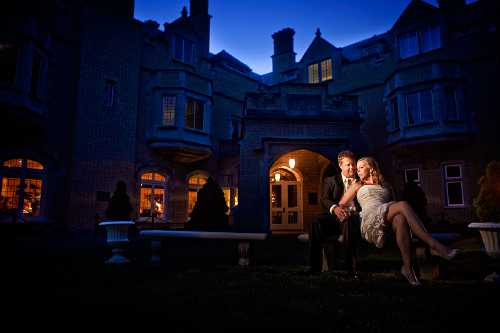It's a common scenario: you buy a DSLR, spend the time it takes to learn how to use it, and starting thinking about opening a photography business. While it is possible to simply start a Facebook page and announce your grand opening, that's not the best approach for long-term success as a professional photographer who doesn't live paycheck-to-paycheck. Yet, as creatives, photographers may have a hard time wrapping their brains around what it takes to be a successful business person.
Gary Hughes, a photographer at Hughes Fioretti Photography in Orlando Florida and Creative Live instructor on topics including the Business of Professional Headshots has five tips for creatives thinking about opening up shop.
1) Think Long and Hard About It: Nothing can make you hate your passion like doing it for a living. Plenty of people enjoy photography as a joyful and fulfilling hobby while having another career that pays the bills. Just because you love something does not mean it should be your job. In fact, having the thing you love to do be separate from work can help create peace and balance in daily life that otherwise may not exist. On the other hand, having a job that you are passionate about it is a wonderful life unlike any other. Consider the possibility of not doing it first and if you truly can't picture yourself doing anything else, you might be in the right head space to grow a successful business.
2) Analyze Your Market: Even though creative entrepreneurs are usually in it for the love of the art, business is still business and you should be in it to make money. Photographers tend to think with their heart first instead of their heads, which can land them in some tough places financially. One of the most common mistakes is a failure to understand and respond to a given market. For example, if you open a wedding photography business in an area that is mostly made up of senior citizens, you will likely not be successful. But, if you try to understand what your market needs are and create a business around that, success is much more likely. Visit government websites (census bureau etc.) to gather the data you might need to form a plan of attack. Analyzing market data is not sexy, but guess what is? Money. This type of analysis can help you earn enough money to live comfortably doing something you love.
3) Do the Math: This is critical. So many small business owners set up shop, put themselves out there, and hope for the best, never giving thought to the basic costs of running a business. Here they are in all their no-nonsense glory:
-Budget - Figure out how much money you need to make in order to make a living and write an income projection that covers it. Find out what your cost of doing business is and come up with the numbers you need to cover it. If you need to gross $100k next year as a wedding photographer to cover expenses, that's 20 weddings at $5k each or 40 weddings at $2.5k. There are tons of resources available to help photographers determine those numbers online, like the Professional Photographers of America's benchmark survey which has a breakdown of how a photography business needs to operate.
-Pricing - Creative professionals often have "artist guilt" that can cause them to undercharge for their work. Under pricing will sink any business. There is a cost of sale for every service and product a photographer sells and it is usually way more than one might think. If a photographer sells an 11x14 print at a markup on just the physical cost of the print, they won't make any money. If that 11x4 costs $5 to print and you sell it for $10, the photographer just paid their client for the privilege of taking their pictures. Consider that the cost of your licensing, insurance, rent, utilities, equipment, marketing and time all have to be accounted for in every product and service that goes out the door. Once a business owner starts to look at their prices from that perspective, it becomes clear that to make a living, the prices have to go up. Undercharging not only can hurt an individual business but it can hurt a whole local industry. A few photographers who don't understand how to charge appropriately can destabilize a local market. Undercutting not only takes income away from other small business owners, but if enough photographers are undercharging it will cause them to go out of business sooner and possibly take others down with them.
4) Stand Apart: With such easy access to photography equipment, every market is oversaturated. Do a search online for wedding photographers and check it out. There are hundreds, and in some cases, thousands of them per city of varying quality. To truly be successful as a creative professional, you have to bring something new or better to the market. Whether that's style, quality, products or service, being different can be a powerful motivator for people to hire you. Do not make the mistake of following the trends. As Wayne Gretzky once said "A good hockey player plays where the puck is. A great hockey player plays where the puck is going to be." The most successful photographers in the industry have always brought something new to the table. Bringing your own unique vision to a business can provide an advantage over any competition.
5) Community: The challenges of starting and growing a small business can be enormous and rob you of what could otherwise be an extraordinary adventure. Being part of a community of like-minded people with the same fears and struggles is helpful in not feeling alone, but the greatest key is to be a part of a community of like-minded people who have been where you are going, who have failed, failed again and succeeded doing what you aim to do. Look for non-profit, professional associations for photographers with the resources, education and access to community to help photographers along; not to mention benefits like insurance and legal resources to help them grow and prosper. As an example, the Professional Photographers of America (PPA) has been a resource for photographers since the 19th century. Get plugged in, get educated and draw on the strength of a community thousands of other professional photographers. Most cities and metropolitan areas also have local groups of photographers who can be a source of support.





